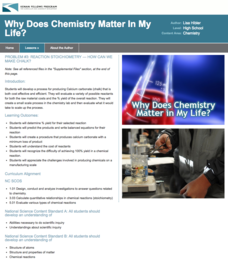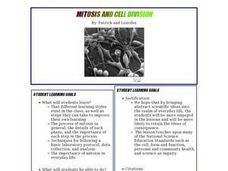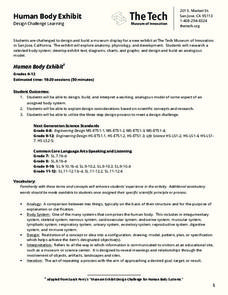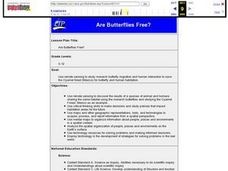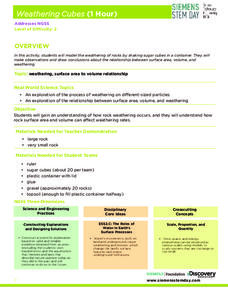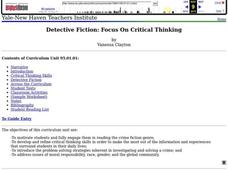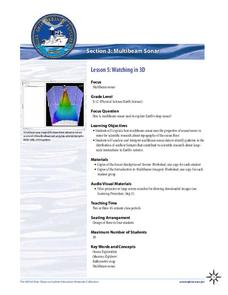Kenan Fellows
Reaction Stoichiometry—How Can We Make Chalk?
What is a reasonable percent yield in the manufacturing process? Scholars develop a process for producing chalk in the third activity of a six-part series. Then, they must determine the theoretical and percent yield. Discussions about...
Curated OER
Adolescent Sleep
Students discuss, summarize, and express alternative positions regarding a study on adolescent sleep. They examine arguments for and against changing the school start time for high-school students, based upon the findings of a scientific...
PHET
Earth’s Magnetic Field from Space
Feel the pull of science! The final installment of this 18-part series is an application of everything learned in the previous high school lessons. Scholars are given a magnetic field map and must propose an arrangement of magnets that...
Curated OER
Mitosis and Cell Division
Students discover the processes that occur during mitosis and what makes each phase different and distinct from the others as well as how each contribute to the overall process of mitosis by looking at onion root tips under a microscope.
Serendip
Introduction to Osmosis
A chicken egg is a very large cell—perfect for investigating osmosis! Scholars conduct an experiment with vinegar and eggs that helps them understand the process of osmosis. They follow the activity with an in-depth look at osmosis in...
Curated OER
As a Matter of Fact
Elementary-aged scientists discover that all matter has mass. They are shown the difference between mass and weight, and learn how to calculate mass using the appropriate tools and methods. The scientific method is used while estimating...
Messenger Education
Snow Goggles and Limiting Sunlight
Why would someone need contact lenses that offer UV protection? With a 28-page packet full of instruction and worksheets, learners discuss solar radiation and its potential harm to eyes. They make snow goggles similar to ones hunters...
Serendip
Cell Differentiation and Epigenetics
Pregnant women exposed to PAH air pollution increase the risk of obesity in their children. The example of epigenetics, along with others, builds the basis for understanding the process of cell differentiation. Scholars view a video,...
Curated OER
Science NetLinks: Adolescent Sleep
Wake up, sleepy head! High schoolers craft a creative presentation that represents how they feel when they wake up on a school morning. After the presentations, a reading of Academic Sleep Times and Academic Performance launches a...
Curated OER
Water Cycle
Identify and interpret the earth's different water sources. Third and fourth graders describe and demonstrate the process of the water cycle, make a model of its two main parts, and predict and infer to answer questions about the model.
Core Knowledge Foundation
Rocks & Minerals
Take young geologists on an exploration of the rock cycle with this six-lesson earth science unit on rocks and minerals. Through a series of discussions, demonstrations, and hands-on investigations your class will learn about the...
Tech Museum of Innovation
Human Body Exhibit
Explore human anatomy and physiology using models. Scholars study systems of the human body and design a display for a museum exhibit. To complete the activity, individuals create analogous models of their chosen human body systems.
Curated OER
Are Butterflies Free?
Students use remote sensing to study monarch butterfly migration and human interaction to save the Oyamel forest (Mexico) for butterfly and human habitation.
Core Knowledge Foundation
Genetics and the Master Race
How did the beginnings of genetic research influence the Nazi party? A thorough, engaging unit incorporates the work of Gregor Mendel, the study of inherited traits, and the use of racism and discrimination during the Holocaust.
Sea World
Endangered Species
Study different endangered species with several activities that incorporate math, science, language arts, and research strategies. A great addition to your lesson on conservation or Earth Day.
Discovery Education
Weathering Cubes
Weathering is not necessarily a result of the weather. Scholars conduct an experiment to explore the effect of surface area and volume on the weathering process. They create their own sugar cube rocks using the same number of cubes—but...
California Academy of Science
What Would Happen?
Nothing says classroom fun like an invertebrate and a magnifying glass! Snails, earthworms, and roly-poly bugs become the center of attention as pint-sized investigators hone their inquiry and observation skills. They are guided through...
Curated OER
Detective Fiction: Focus On Critical Thinking
Turn your 6th graders into detectives while growing their love of reading. Using critical thinking skills, they will be able to describe the five basic elements of detective fiction, read detective novels, make predictions, use the...
Curated OER
CO2 and You
Students study the scientific evidence about carbon dioxide emissions. They learn to calculate the amount of energy used by different appliances. They complete a worksheet which analyzes the amount of energy that their home uses.
Monroe City Schools
Clouds! Clouds! Clouds!
Here is a beautiful lesson on clouds designed for your 1st graders. Learners study three different types of clouds. They construct drawings of cumulus, cirrus, and stratus clouds. The Cloud Book, by Tommie dePaola is used to introduce...
Virginia Department of Education
The Ratio of Surface Area to Volume
Demonstrate the ratio of surface area to volume in your high school class by using phenolphthalein, gelatin, and an onion. Intrigue the class by leading a discussion on osmosis and diffusion, then making "scientific jello." Participants...
NOAA
Watching in 3D
Bring the ocean floor to life! Earth science scholars discover the process of deep sea mapping in the third installment in a series of five lessons about ocean exploration. The teacher's guide includes helpful resources, worksheets, and...
Curated OER
The Art of Soap Making
Here is a nice, clean wrap-up lesson for your chemistry class when they are studying chemical reactions . They experiment with different oils to make soap. To make it more fun, they are to imagine that they are part of a soap testing...
Curated OER
Vaccines
High schoolers explore and explain the role of vaccines in infectious disease, They emphasize immunological principles and viral/bacterial infection processes. Students explore the three main vaccine types: DNA vaccines ("gene gun"),...


